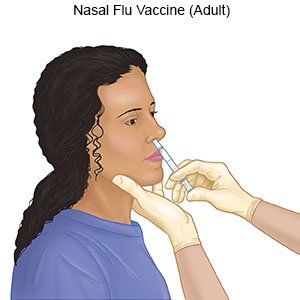Nasal Flu Vaccine for Adults
Medically reviewed by Drugs.com. Last updated on Aug 4, 2025.
AMBULATORY CARE:
The nasal flu vaccine
is sprayed into your nose to help prevent influenza (the flu). The flu is caused by a virus. The virus spreads through direct contact with someone who has the flu. For example, a person with the virus on his or her hands can spread it by shaking hands with someone. Several types of viruses cause the flu. The viruses change over time, so new vaccines are made each year. The vaccine begins to protect you about 2 weeks after you get it. Get the vaccine as soon as recommended each year, usually starting in September or October.
 |
What to tell your doctor before you get the nasal flu vaccine:
- You have any allergies, or you have asthma.
- You have a chronic health problem, such as diabetes, a heart or lung disease, or a blood disorder.
- You have kidney disease or receive dialysis.
- You have chronic liver disease or alcohol use disorder.
- You developed Guillain-Barré syndrome within 6 weeks of getting a flu vaccine. You may not be able to get any flu vaccine unless your provider feels the benefits outweigh the risks.
Reasons you should not get the nasal flu vaccine or should wait to get it:
- You are 50 years or older.
- You are sick or have a fever of 101°F (38.3°C) or higher.
- You had an allergic reaction to a flu vaccine or any part of it.
- You have a weak immune system, or you care for someone else who does.
- You do not have a spleen, or your spleen does not work properly.
- You are pregnant or will become pregnant during the current flu season. A flu shot is recommended instead.
- You took antiviral medicine for the flu in the past 3 weeks.
- You have a cerebrospinal fluid (CSF) leak or a cochlear implant.
Risks of the nasal flu vaccine:
The vaccine may cause mild symptoms, such as a fever, headache, and muscle aches. You may still get the flu after you receive the vaccine. You may have an allergic reaction to the vaccine. This can be life-threatening.
Related medications
Call your local emergency number (911 in the US) if:
- Your mouth and throat are swollen.
- You are wheezing or have trouble breathing.
- You have chest pain or your heart is beating faster than normal for you.
- You feel like you are going to faint.
Seek care immediately if:
- Your face is red or swollen.
- You have hives that spread over your body.
Call your doctor if:
- You feel weak or dizzy.
- You have questions or concerns about the flu vaccine.
Follow up with your doctor as directed:
Write down your questions so you remember to ask them during your visits.
© Copyright Merative 2025 Information is for End User's use only and may not be sold, redistributed or otherwise used for commercial purposes.
The above information is an educational aid only. It is not intended as medical advice for individual conditions or treatments. Talk to your doctor, nurse or pharmacist before following any medical regimen to see if it is safe and effective for you.
Further information
Always consult your healthcare provider to ensure the information displayed on this page applies to your personal circumstances.
